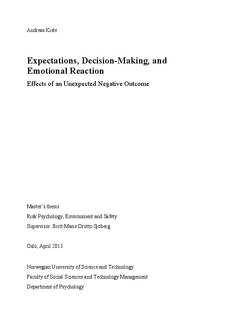| dc.description.abstract | This thesis is a theoretical review of the effects of an unexpected negative outcome on a decision-maker that may occur in spite of prior decisions supported by normative rules or probability estimates such as expected value. The main research question focuses on whether the decision-maker becomes risk-averse (similar to a flight response) or risk-taking (similar to a fight response) following an unexpected negative outcome of a prior decision. The hypothesis, influenced by Prospect Theory, is that a person in such a situation would be inclined to take risks rather than avoid risks. The “tilt” reaction due to a “bad beat,” an incident observed in the monetary game of poker, is used as an example of the reviewed phenomena. The literature selected to investigate the hypothesis involves theories of emotions, moods, feelings or affects as well as aspects of cognitive processing. It is assumed that the interaction between emotional experience and logical thinking is the key to understanding the effects on decision-making of an unexpected negative outcome. The thesis suggests that a decision-maker's behavior is influenced by the degree of experience of a similar outcome, the degree of violation of an expected outcome, the significance of the investment, and the personal ability to process information in a rational manner. The thesis concludes that an experienced decision-maker who experiences a possible but not probable negative outcome loses both monetary value and personal utility (reputation as an experienced decision-maker), will feel derived of a probable outcome, and show risk-taking behavior. The thesis further concludes that a novice decision-maker who experiences an unexpected negative outcome, and loses monetary value, will feel disappointed, and show risk-aversive behavior. Violations of an expected outcome create varied degrees of arousal and negative mental states, e.g. anger, surprise and disappointment, basically because the outcome violates (false) expectations of fairness. Such a violation might in some cases result in strong physical reactions such as violent behavior. It is suggested that extreme reactions, or "hot tilts," would be more likely among experienced players because they are expected to experience greater surprise or violation and have higher personal investments at stake. The less experienced player, however, would more probably display a "cold tilt" and risk-averse behavior. The interpretations are discussed in relation to theories available in the literature. | nb_NO |
